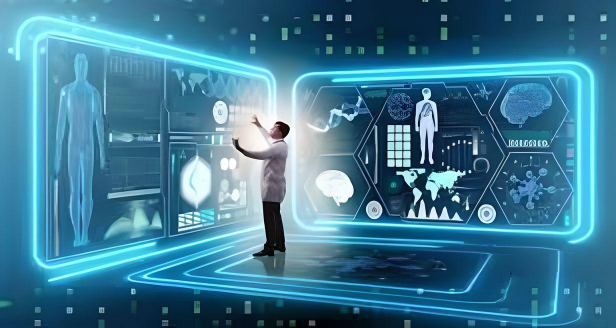The Role of AI in Revolutionizing. Artificial Intelligence (AI) is fundamentally transforming healthcare, improving diagnostic accuracy, speeding up drug development, and personalizing treatments. Here’s how AI is reshaping healthcare operations:
1. Key Applications of AI in Healthcare
AI-Powered Diagnostics
AI excels at analyzing medical images (like MRIs, CT scans), detecting early signs of diseases like cancer with better accuracy than traditional methods.
Drug Discovery
AI accelerates drug discovery by simulating biological processes, helping pharmaceutical companies test new treatments faster.
Personalized Medicine
AI algorithms analyze genetic and lifestyle data to develop personalized treatment plans, improving patient outcomes.
Robotic-Assisted Surgeries
Robotics combined with AI allow surgeons to perform minimally invasive procedures with enhanced precision, reducing recovery times.
Virtual Health Assistants
AI-powered chatbots assist patients with managing chronic conditions and answering medical queries, improving accessibility.
| AI Use Case | Benefit |
|---|---|
| Diagnostics | Early disease detection, accuracy improvement |
| Drug Discovery | Accelerated drug testing, cost reduction |
| Robotic Surgeries | Precision, minimally invasive procedures |
| Personalized Treatments | Tailored care for better outcomes |
| Virtual Health Assistants | 24/7 patient support |
2. Pros of AI in Healthcare
- Efficiency: Reduces administrative tasks and speeds up patient care.
- Accuracy: Detects diseases early and suggests precise treatments.
- Cost Savings: Streamlines operations, lowering healthcare costs.
- Patient Empowerment: AI tools help patients track their health.
3. Cons of AI in Healthcare
- Data Privacy Risks: Heavy reliance on sensitive patient data may increase risks of breaches.
- High Implementation Costs: Investing in AI technology is expensive for healthcare institutions.
- Dependence on Technology: Over-reliance may reduce the personal touch in patient care.
| Pros | Cons |
|---|---|
| Efficiency Improvement | Data Privacy Concerns |
| Cost Savings | High Implementation Costs |
| Enhanced Accuracy | Lack of Human Judgment in Care Decisions |
4. Advantages of AI in Healthcare
- Faster Diagnosis: AI analyzes data more quickly, helping doctors treat patients faster.
- Continuous Learning: AI learns from data and continuously improves its efficiency.
- Scalability: AI systems can easily scale, serving larger patient populations.
5. Disadvantages of AI in Healthcare
- Lack of Empathy: AI lacks the human touch needed in patient care.
- Bias in Algorithms: If AI is trained on biased data, it may perpetuate inaccurate diagnoses or treatments. The Role of AI in Revolutionizing.
6. Tips for Implementing AI in Healthcare
- Data Security: Establish strong data protection measures to ensure patient privacy.
- Staff Training: Provide adequate training for healthcare workers to fully utilize AI systems.
- Collaborate with Tech Providers: Work closely with AI developers to create tailored solutions for healthcare needs.
Conclusion
AI is revolutionizing healthcare with its capacity for fast diagnostics, personalized treatments, and streamlined processes. While the technology brings undeniable benefits, challenges such as data security, costs, and the lack of human empathy in care must be carefully considered.
7. AI’s Role in Telemedicine
AI’s integration into telemedicine platforms has revolutionized remote healthcare by enabling real-time analysis of patient data. The Role of AI in Rehttps://www.sangfor.com/blog/cloud-and-infrastructure/role-of-ai-in-manufacturing-industryvolutionizing Healthcare Systems.AI-driven diagnostic tools allow physicians to provide instant feedback during virtual consultations, improving accessibility, particularly in rural areas. These tools also empower patients to manage chronic conditions effectively with AI-driven apps that offer health tracking and personalized insights.
Table of Contents
8. Streamlining Administrative Tasks with AI
AI is also improving administrative efficiency in healthcare by automating routine tasks like scheduling, billing, and patient record management. With AI’s ability to process large volumes of data swiftly, healthcare staff can focus more on patient care rather than being burdened with administrative tasks. AI-powered chatbots can manage patient inquiries, reducing wait times for customer service and enhancing patient experience.
9. Ethical Considerations in AI Adoption
While AI offers many benefits, ethical concerns around its use in healthcare cannot be ignored. AI’s decision-making processes must be transparent and free from biases, especially when they affect patient outcomes. Additionally, healthcare providers must ensure equitable access to AI-powered healthcare services so that advancements do not deepen existing disparities in access to care. These ethical considerations must be at the forefront of AI implementation in healthcare systems.
FAQs
- What is AI’s biggest impact on healthcare?
AI significantly improves diagnostic accuracy and speeds up the treatment process. - Are AI surgeries safer than human-operated ones?
AI-assisted surgeries are often more precise, but human oversight is always essential. - How does AI help in drug discovery?
AI simulates biological processes to test drugs quickly and efficiently. - Can AI fully replace doctors?
No, AI enhances doctors’ capabilities but does not replace the need for human care. - Is patient data safe with AI?
Data security is a major concern, and healthcare institutions must ensure strict protocols.


